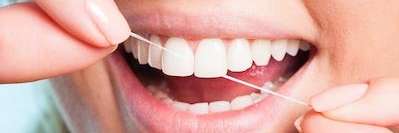
Learning the reason or reasons behind your sensitive teeth gives you a better idea of how to treat the issue. Let’s look at a few common causes of sensitive teeth, and how to treat them with our dentist in Lakeland, FL.
8 Common Causes of Sensitive Teeth
Sometimes, people have mild tooth sensitivity, and the underlying cause is not specific. However, when we can uncover sensitive teeth causes, we can take measures or provide tips to alleviate your discomfort.
According to statistics published by the University of Utah, as many as one in eight American adults suffers from tooth sensitivity at one time or another. It can be severe—the sensation you’re biting on tinfoil—or mild.
#1 Receding Gums
Periodontal disease often leads to gum recession. When gums recede, this exposes a bit of the tooth root, which usually means tooth sensitivity and pain.
The only way to treat gum disease is through your Lakeland, FL, dentist. Periodontal treatment may include specialized cleanings, tooth root smoothing, gum grafting, and special instructions for at-home care.
#2 Teeth Whitening Products
If you plan to whiten your smile, we recommend doing so under the care of your dentist. Kits and systems you purchase on your own can damage your tooth enamel and irritate the gums.
Even professional teeth whitening can cause temporary sensitivity in some cases, but this does not last long!
If you’re in the process of whitening your smile and your teeth feel sensitive, try abstaining for a few days. If symptoms don’t improve, contact our dental office for further instructions.
#3 Tooth Enamel Breakdown
Fluoride is an excellent way to strengthen your tooth enamel, preventing oral health conditions and mitigating your risk for tooth sensitivity.
If your enamel is weak, we may recommend a fluoride treatment to remineralize your tooth enamel.
#4 Overzealous Brushing and Flossing
It’s important to brush and floss regularly, but it’s also crucial to do these things correctly. For example, you want a soft-bristled toothbrush, and you want to work in a circular motion, gently brushing each tooth on all sides. Likewise, with floss, you want to be careful never to force it through a crowded area.
Brushing and flossing too hard or too long can also irritate your gums, another tooth sensitivity culprit.
Switch up the way you’re brushing and flossing and see if you notice improvement.
#5 Oral Infection
An oral infection, specifically at the center of a tooth, can cause tooth sensitivity and eventually excruciating pain. The only treatment for this type of infection is root canal therapy with your dentist.
Despite the folklore, root canal treatment is gentle, designed to eliminate pain and restore tooth health.
#6 Tooth Decay
An emerging tooth cavity and untreated decay often cause sensitivity and pain. The best way to stay on top of potential cavities is to visit your dentist regularly for teeth cleanings and checkups. Unfortunately, if you already have a cavity, the only solution is a tooth-colored filling in our dental office.
#7 Broken Restorations or Tooth Chips
Restorations like dental crowns and tooth fillings protect teeth from further damage or the need for extraction. However, if you have a cracked or loose-fitting restoration (or a chipped tooth), this can leave the inner workings of a tooth exposed, which can cause infection, pain, and sensitivity.
If you notice an ill-fitting or broken restoration or a cracked tooth, see your dentist as soon as possible.
#8 Unknown Cause or Temporary Issue
Sometimes, we accidentally bite into a fork or eat something a little too hot or cold. No matter the cause, temporary tooth sensitivity without an underlying issue is nothing to worry about. Instead, try switching to an alcohol-free mouthwash and toothpaste designed for sensitive teeth. Ensure the products you choose are approved by the American Dental Association—carrying the ADA seal of approval.
How to Get Rid of Sensitive Teeth
Here are a few tips and tricks from our dentists in Lakeland, FL on dealing with sensitive teeth.
#1 Reimagine Your Home Care Routine
Believe it or not, your brushing technique could impact your tooth enamel! Vigorous brushing can wear away tooth enamel and damage delicate gum tissues, which causes root exposure.
Brushing gently with a soft-bristled toothbrush and using toothpaste designed for tooth sensitivity can help to reduce uncomfortable enamel erosion and keep your teeth from feeling sensitive.
#2 Protect Your Teeth With Fluoride
Your Lakeland dentist may recommend prescription strength fluoride to help reduce tooth sensitivity. It's easy to use and incorporate into your regular home care routine. In addition, fluoride helps to rebuild worn or decayed tooth enamel, which can reduce sensitivity.
#3 Use a Mouth Guard During Sleep
Your dentist may also recommend a protective night guard to wear while you sleep to block your teeth from the damage caused by clenching and grinding (bruxism). Clenching and grinding your teeth can cause enamel wear and erosion, resulting in sensitive teeth. Wearing a night guard protects your teeth from bruxism.
#4 Cover Your Tooth With a Sealant
Sometimes your dentist can use a simple dental sealant to cover an exposed root and relieve sensitivity. A sealant is a plastic coating applied to your tooth that hardens and protects it.
Contact Our Lakeland Dentists for Sensitive Teeth Treatment
Your dentist can talk to you about how to help sensitive teeth and provide an exam to make sure there are no underlying issues.
Give us a call today at (863) 858-3891 to schedule your next exam and teeth cleaning in Lakeland.
